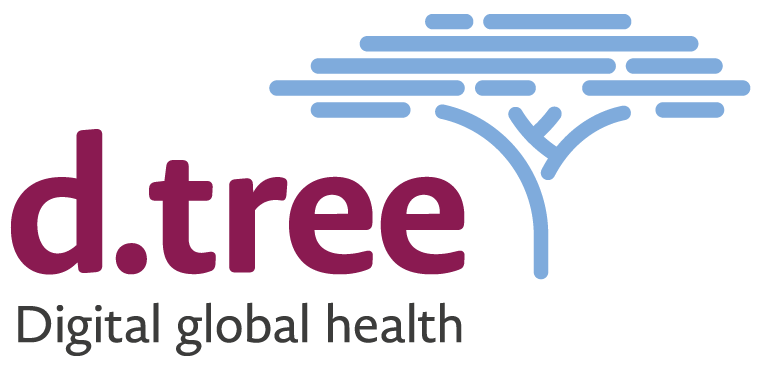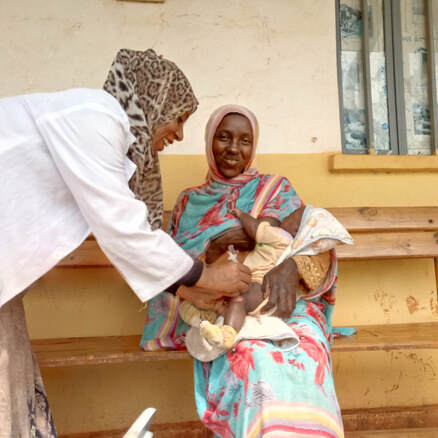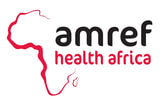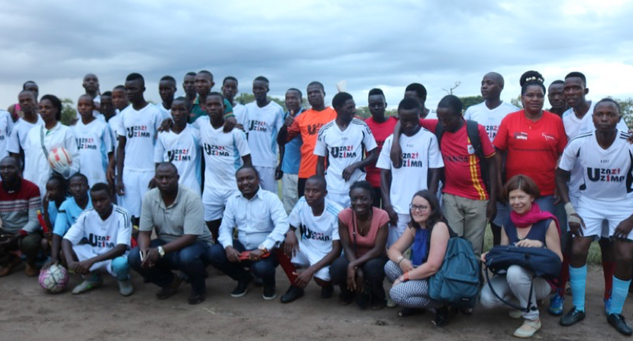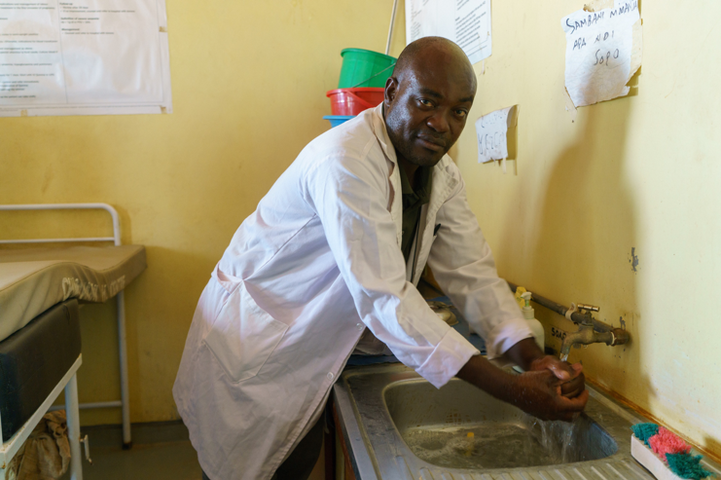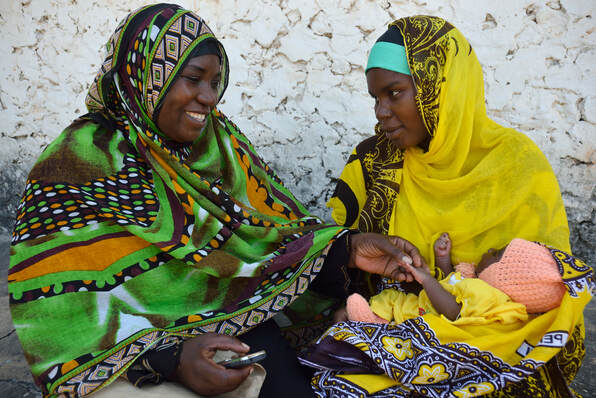 Credit: Mark Leong
Credit: Mark Leong
Since 2011, D-tree International has been training and supporting community health volunteers (CHV) in Zanzibar to provide maternal, newborn and child health care, with the assistance of digital technology.
The Zanzibar government has now incorporated D-tree International’s digital CHV programme into the formal health system at a national level. Since 2018, D-tree International has worked alongside the Ministry of Health to design and roll-out the CHV programme, named Jamii ni Afya (Community is Health). Once fully scaled, the Jamii ni Afya programme will ensure that all of Zanzibar’s 1.6 million people can access high quality health services.
D-tree has asked the James Percy Foundation to support the roll-out of the Jamii ni Afya programme in Zanzibar’s Central district. During the 3-year project, D-tree will train and support 122 Community Health Volunteers and 15 supervisors to use digital tools, with the aim of improving maternal and newborn health, nutrition, early childhood development and immunisation tracking.
Through its work in Central district, D-tree International hopes to:
The Zanzibar government has now incorporated D-tree International’s digital CHV programme into the formal health system at a national level. Since 2018, D-tree International has worked alongside the Ministry of Health to design and roll-out the CHV programme, named Jamii ni Afya (Community is Health). Once fully scaled, the Jamii ni Afya programme will ensure that all of Zanzibar’s 1.6 million people can access high quality health services.
D-tree has asked the James Percy Foundation to support the roll-out of the Jamii ni Afya programme in Zanzibar’s Central district. During the 3-year project, D-tree will train and support 122 Community Health Volunteers and 15 supervisors to use digital tools, with the aim of improving maternal and newborn health, nutrition, early childhood development and immunisation tracking.
Through its work in Central district, D-tree International hopes to:
- Increase the percentage of pregnant women who attend four or more ante-natal visits during pregnancy from 53% to 65%.
- Increase the percentage of babies delivered at a health facility from 60% to 80%.
- Increase the percentage of caregivers with adequate knowledge of Minimum Acceptable Diet from 23% to 50%.
|
The 2016 Ethiopia Demographic and Health Survey (EDHS 2016) showed that child health outcomes are very poor in the Southern Nations, Nationalities and Peoples’ Region (SNNPR) and Oromia regions of Ethiopia. Against the national infant mortality rate of 48 per 1,000 live births and 67 for under-five mortality, in Oromia the infant mortality rate is 60 and the under-five mortality rate is 79 per 1,000 live births; in SNNPR infant mortality and under-five mortality are even higher, at 65 and 88 per 1000 live births respectively. Key factors in this include low immunisation coverage; lack of access to related services; and shortage of vaccines at health facilities, especially at health posts.
Coverage of maternal health services is poor in Oromia and SNNPR; antenatal care coverage was 50.7% in Oromia and 69.3% in SNNPR, and the proportion of deliveries attended by health personnel was 19.7% in Oromia and 28.6% in SNNPR according to EDHS 2016. |
Utilisation of family planning is also low in the targeted regions, even though it is evident that by reducing the number of unintended pregnancies maternal mortality rates decrease. According to EDHS 2016, about 29% of married women in Oromia and 21% in SNNPR have an unmet need for family planning; the proportion of women who want to limit their childbearing is highest in SNNPR and Oromia (at 40% each).
This project aims to address limited access to, and the low quality of, maternal, neonatal and child healthcare as well as family planning in the Kofele woreda, Oromia region and Aleta Chuko woreda, SNNPR, Ethiopia.
Key activities will include (i) training (or retraining) all Health Extension Workers in the target area on integrated community case management of malaria, pneumonia and diarrhoea, on immunisation, and on family planning; (ii) community mobilisation sessions and orientation meetings with religious and clan leaders on institutional deliveries, family planning and child health; (iii) provision of immunisation defaulter tracing and referral tools, as well as colour coded health calendars; (iv) creating/improving linkages between health posts, health centres and referral hospitals for obstetric and newborn care,(v) training two nurses from every health centre on basic emergency obstetric and newborn care; (vi) improving data quality through training, and data quality audits; and (vii) Improving quality of care through supportive supervision and performance reviews.
Some of the changes that IRC hope to achieve during the second year of the grant period include:
This project aims to address limited access to, and the low quality of, maternal, neonatal and child healthcare as well as family planning in the Kofele woreda, Oromia region and Aleta Chuko woreda, SNNPR, Ethiopia.
Key activities will include (i) training (or retraining) all Health Extension Workers in the target area on integrated community case management of malaria, pneumonia and diarrhoea, on immunisation, and on family planning; (ii) community mobilisation sessions and orientation meetings with religious and clan leaders on institutional deliveries, family planning and child health; (iii) provision of immunisation defaulter tracing and referral tools, as well as colour coded health calendars; (iv) creating/improving linkages between health posts, health centres and referral hospitals for obstetric and newborn care,(v) training two nurses from every health centre on basic emergency obstetric and newborn care; (vi) improving data quality through training, and data quality audits; and (vii) Improving quality of care through supportive supervision and performance reviews.
Some of the changes that IRC hope to achieve during the second year of the grant period include:
- Increasing the percentage of under 5 children receiving the first dose of Diphtheria, Tetanus and Pertussis containing vaccines from 64.8% (at baseline) to 90% in the Kofele District and from 76.7% (at baseline) to 91% in the Aleta Chuko District.
- Increasing the percentage of deliveries attended by skilled health personnel from 19.7% (at baseline) to 65% in the Kofele District and from 28.6% (at baseline) to 65% in the Aleta Chuko District.
- Increasing the percentage of family planning acceptors among non-pregnant women of reproductive age from 28% (baseline) to 70% in the Kofele District and from 40% (at baseline) to 60% in Aleta Chuko District.
Across Tanzania, the maternal mortality rate was recorded as rising from 432 per 100,000 live births in 2012 (as per the National Census Report), to 556 per 100,000 in 2015/16 (as per the Tanzania Demographic and Health Survey). The situation for women and pregnant mothers is becoming worse, not better. The Tanzanian Ministry of Health has identified the Simiyu region as a priority in tackling poor maternal and child health outcomes.
Uzazi Uzima II, meaning ‘Safe Deliveries’ aims to address this by increasing the use and availability of quality maternal and new-born health services within the Simiyu region. Examples of activities supported by this grant include:
Uzazi Uzima II, meaning ‘Safe Deliveries’ aims to address this by increasing the use and availability of quality maternal and new-born health services within the Simiyu region. Examples of activities supported by this grant include:
- Training 60 health workers on Kangaroo mother care, .
- Training 800 community health workers on community based RMNCAH, WASH, and nutrition.
- Conducting sensitisation activities to schoolchildren in 145 schools on their right to access RMNCAH, WASH, and nutrition services.
- Conducting community sensitisation and mobilisation on utilisation of quality RMNCAH, WASH, and nutrition services, to ultimately benefit 792,079 men, women and children.
According to WaterAid only 25% of health clinics in Malawi have access to clean water, 8% have no toilets at all and 54% do not have waste receptacles. As a result, clinics are not hygienic and midwives are unable to wash their hands between deliveries, increasing the risk of bacterial infections, often fatal for mothers and newborns. This project focussed on delivering water, sanitation and hygiene (WASH) interventions to health clinics and communities in the Nkhotakota, Kasungu and Machinga districts of Malawi.
Thanks to this project:
Thanks to this project:
- 16 health facilities have improved, inclusive WASH facilities.
- Over 600 community facilitators and health facility staff were trained on WASH and Mother and Newborn Health.
- 98% of women in the target areas gave birth at health centres (vs 91% before the project began)
- 43,764 people gained access to sustainable and inclusive WASH services.
- Close to 200,000 people were reached with hygiene promotion activities. This was lower than expected but WaterAid are continuing their hygiene work in the target areas.
James Percy Foundation
Registered with the Charity Commission 1144494
Registered with the Charity Commission 1144494
